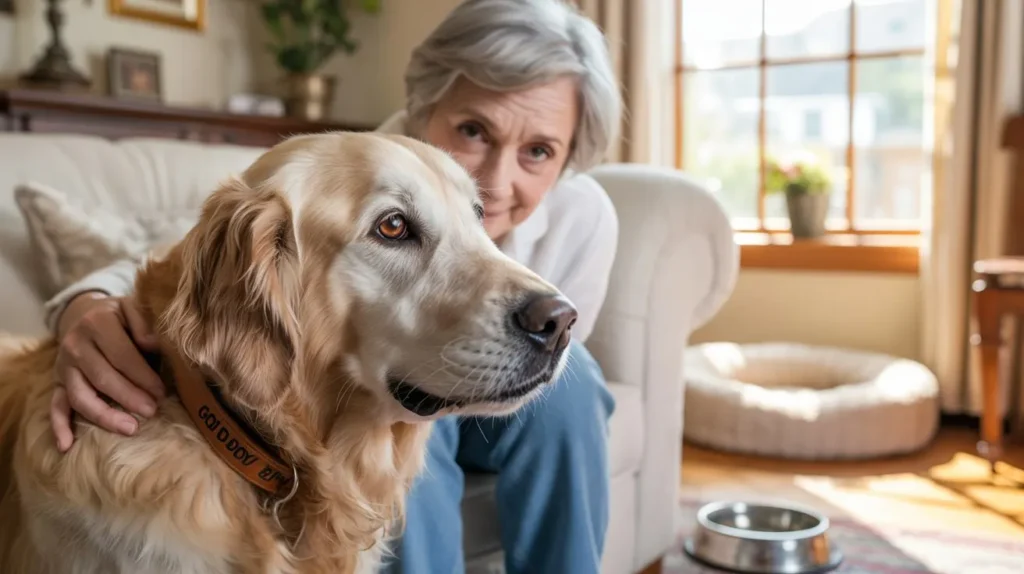Senior Dog Care Tips: How to Take Care of Your Older Dog 2025

Dogs are more than pets. They are our family. As they grow older, they need extra love, care, and attention. Just like humans, dogs also face changes in their body and mind as they age.
If you have an older dog, don’t worry! With the right care, your furry friend can still enjoy a happy and active life. Here are some simple and practical senior dog care tips to help your pet age gracefully.
When is a Dog Considered a Senior?
Dogs become seniors at different ages, depending on their size and breed.
- Small breeds (like Pomeranians) – senior at around 8-10 years
- Medium breeds (like Beagles) – senior at around 7-9 years
- Large breeds (like German Shepherds) – senior at around 6-8 years
- Giant breeds (like Great Danes) – senior at around 5-7 years
As dogs grow older, they slow down, their senses weaken, and they may face health problems. That’s why senior dog care is very important.
Here is the some Senior Dog Care Tips
1. Regular Vet Check-ups
As your dog grows older, regular health check-ups are a must.
- Take your dog to the vet at least twice a year.
- Early detection of diseases like arthritis, kidney problems, or heart issues can help in better treatment.
- Ask your vet to run blood tests, urine tests, and dental check-ups.
Tip: Always note any behavior changes and tell your vet.
2. Balanced Diet for Senior Dogs
Old dogs need a different diet than younger ones.
- Feed your dog a high-quality senior dog food. These are made especially for older dogs.
- Look for food rich in fiber, vitamins, omega-3 fatty acids, and fewer calories.
- Avoid overfeeding. Older dogs can gain weight easily, which is not healthy.
- Provide plenty of fresh clean water.
Foods to Avoid:
- Too many fatty treats (can cause obesity).
- Hard treats (if your dog has dental problems).
Tip: Talk to your vet before changing your dog’s diet.
3. Watch Their Weight
Keeping a healthy weight is very important for older dogs.
- Obesity can cause joint pain, diabetes, and heart disease.
- Weigh your dog once a month and keep track.
- Give treats in moderation. Choose healthy treats like carrot sticks or dog biscuits with low calories.
Tip: If your dog is overweight, ask the vet for a weight loss plan.
4. Exercise Gently but Regularly
Senior dogs still need exercise, but not too much.
- Short walks twice a day are perfect.
- Avoid running or jumping too much as their joints may hurt.
- Gentle playtime helps keep their body and mind active.
Signs Your Dog is Overdoing It:
- Limping
- Heavy panting
- Lying down and refusing to move
Tip: Swimming is great exercise for senior dogs. It is easy on the joints.
5. Comfortable Sleeping Area
Older dogs often have joint pain and arthritis. Give them a comfortable space to sleep.
- Use a soft orthopedic dog bed.
- Make sure the sleeping area is warm and away from cold floors.
- Avoid stairs if your dog has difficulty climbing.
Tip: You can also use a heating pad or Heated Bed or warm blanket in winter.
6. Take Care of Their Teeth
Dental health is often ignored but very important.
- Brush your dog’s teeth 2-3 times a week.
- Use dog toothpaste (not human toothpaste).
- Give dental chews or toys that clean teeth.
- Get a dental check-up once a year.
Tip: Bad breath can be a sign of dental problems.
7. Grooming and Skin Care
As dogs age, their skin and fur also change.
- Brush your dog regularly to remove loose fur and prevent knots.
- Bathe them with a mild dog shampoo.
- Check for lumps, wounds, or infections on the skin.
- Trim nails carefully to prevent pain while walking.
Tip: Use soft brushes and be gentle, especially if your dog has arthritis.
8. Watch for Behavior Changes
Senior dogs may become less active, sleep more, or act differently.
- Some dogs may show signs of confusion or memory loss (Canine Cognitive Dysfunction).
- They may bark at night, get lost in familiar places, or forget commands.
- Others may become more anxious or easily scared.
Tip: Be patient. Talk to your vet about medication or supplements that support brain health.
9. Support Their Joints
Joint pain is common in older dogs. It makes walking or standing difficult.
- Ask your vet about joint supplements like glucosamine and chondroitin.
- Use ramps or steps to help your dog get on beds or into cars.
- Avoid slippery floors – place rugs or mats for better grip.
Tip: Massaging your dog’s joints gently can help relieve pain.
10. Keep Their Mind Active
Mental stimulation is just as important as physical exercise.
- Play brain games like hide and seek.
- Give puzzle toys that offer treats.
- Teach new simple tricks or commands (even old dogs can learn!).
Tip: Spend quality time talking to your dog and showing affection.
11. Stay on Top of Medications
If your senior dog is on medication:
- Give medicine on time every day.
- Keep a chart or reminder system.
- Don’t stop any medicine without asking your vet.
Tip: Use pill pockets or mix pills with soft food to help your dog take them easily.
12. Be Patient and Loving
Old dogs may not move fast, may make potty mistakes, or may not respond quickly. It’s okay.
- Be patient.
- Use soft, calm words.
- Give lots of hugs, pets, and love.
Tip: You are your dog’s world. Your care means everything to them.
13. Adjust Their Environment
Make your home senior-dog friendly:
- Use non-slip mats or rugs to avoid falls.
- Keep food and water at a comfortable height.
- Keep things in the same place (don’t confuse your dog).
Tip: Keep your dog’s bed, food bowl, and toys in a quiet and calm area.
14. Prepare for End-of-Life Care
No one wants to think about this, but it’s important.
- Talk to your vet about pain management and quality of life.
- Watch for signs of suffering like loss of appetite, no movement, or heavy breathing.
- Be with your dog, hold them, and comfort them during this stage.
Tip: Love and presence matter the most in your dog’s final moments.
15. Enjoy Every Moment
Senior dogs are full of love and wisdom. They may not run fast or jump high anymore, but their love grows deeper every day.
- Take photos, go on slow walks, and cuddle more.
- Make a memory book or journal of special moments.
- Celebrate your dog’s birthday or “gotcha day” every year.
Tip: These golden years can be the most beautiful time you share with your dog.
Conclusion
Caring for a senior dog is a special journey filled with love, respect, and compassion. They have been with you through ups and downs, and now it’s your turn to support them with patience and kindness.
With proper care, your dog can live a longer, happier, and more comfortable life. Keep visiting your vet, feed them right, keep them active, and shower them with love every day.
Your old dog may not be young anymore, but in your heart, they will always be your best friend.



